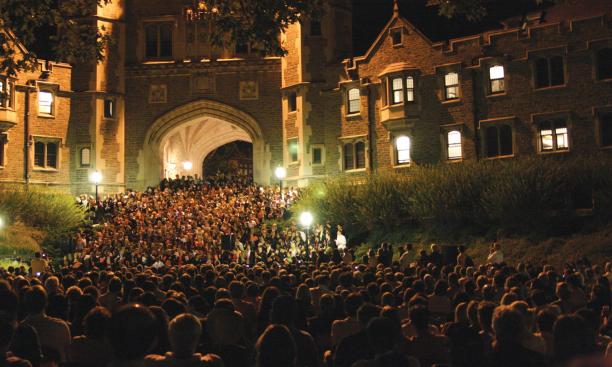

In April the editors of PAW received a letter from Herbert S. Bailey Jr. ’42, recalling his classmates’ optimism as they graduated into World War II. One senior, Bailey wrote, captured the mood in a song he composed that spring for Theatre Intime, ending with the lyrics, “America is okay.” With the Class of 2008 confronting a flagging economy and an unpopular war, Bailey asked, “What are they singing as they graduate?”
I didn’t expect my classmates to provide a literal answer. But as the Senior Step Sing drew to a close on the Sunday evening before Commence-ment, they did just that. We’d already finished half a dozen songs ranging from the traditional (“Goin’ Back to Old Nassau”) to Bon Jovi (“Livin’ on a Prayer”); the audience had swayed in time, holding up lighted cell phones as they might have waved cigarette lighters in years past.
Then, unexpectedly, as the last notes of “Old Nassau” faded away, strains of “The Star-Spangled Banner” began to emerge, coming from a knot of students somewhere up to my left whom friends later identified as members of the football team. Soon nearly all of us on the steps of Blair Arch were belting out the national anthem. Later, audience members described a touching scene: Here were more than a thousand eager young people, in matching orange-and-black jackets, singing praise to their country under the moonlight. It was hard not to think, they said, of people our age on the other side of the globe wearing very different uniforms.
From the steps, though, the song’s meaning was murkier. Many students, to be sure, were singing with sincerity, hands over hearts. But a few near me seemed embarrassed. “Did we seriously just give ourselves an encore?” chuckled one girl, gesturing to her program to emphasize that we were supposed to have relinquished the audience’s attention by now. Considering the mixed reactions, a few days after we were graduated I asked my classmates about the experience we had just shared. What did the song mean to our class?
Some students found the choice funny or stereotypical. “Star-Spangled Banner?” said Chris D’Ambrosia ’08. “Really? How cliché.” Added Mike Wood ’08, who was standing next to the group that had started the singing, “To me it was more of a fratty showing than a timely display of patriotism. Cottage members sing the national anthem at formal events, and many frats often break out into cheers of ‘USA’ as a means of pumping each other up.”
To class president Tom Haine ’08, who was commissioned as a second lieutenant in the Army after Commencement, the song came from traditional patriotism, pure and simple. “I would bet this generation is getting a bit tired of being ashamed of their rightful pride in being Americans,” he said by e-mail. “I am full of optimism as I graduate.” Haine said he is confident that “the great American spirit will regain its indomitable nature in the face of a fragile and hostile world, jealous of our power and ability.”
Cathy Yan ’08, by contrast, expressed some concern about “such a large dose of patriotism” and added, “Super-patriotism has gotten us in a lot of trouble already.” Still, she said, “a spontaneous song is always a good thing, I guess.”
To other students, the anthem suggested a new, subtler form of national pride. “Rather than feel that we ought to go off and fight [in Iraq], I think there is a greater feeling of need to prevent future wars from happening in the first place,” e-mailed Alice Garabrant ’08. While expressing “immense respect” for our troops’ courage, she said, “The feeling of good versus evil that many Americans felt during the Second World War no longer exists, as many of us are equally as appalled and disappointed by our own country’s and government’s actions in recent years as we are by those of our enemies.”
To Veronica Thew ’08 — who said support for the green revolution and fellowships abroad that are intended to foster goodwill are signs that her classmates are optimistic about the nation’s future — the reason we sang wasn’t really the point. What matters, she said, is the fact that we all sang together. “It was a moment of camaraderie,” she said. “We all did it for different reasons ... and I absolutely loved it.”
